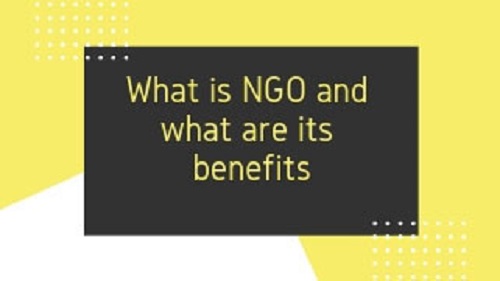Why we use NGO and process of registering an NGO?

What are NGOs?
The role of Non-Governmental Organizations (NGOs) has acquired special relevance in the last decades, has contributed to sensitize public opinion about the problems of development in the World. They also have had a role motivator and often critical to their respective governments, so that they promote actions of international cooperation and increase the resources allocated to Official Development Assistance (ODA).
The NGOs also contribute in the countries to raise awareness among the population about the development problems of our countries. In this way, the forms of aid have been changing, with the combination of short-term and emergency situations, and increasingly devoted to supporting the implementation of micro-projects in the countries of the world to lay the foundations that cont In various parts of the world, NGOs have been planted as a monitoring tool before governments, as for example against the enactment of a law that harms the environment these organizations are a point of incidence and complaint tribute to a more autonomous and lasting development.
How are NGOs financed?
NGOs obtain their funds from different places, from donations from citizens, governments, international organizations or philanthropists. For most of them it is difficult to survive only with small donations from citizens and cannot afford to invest money in fundraising campaigns with people on the street looking for partners or through call centers to obtain donations by phone, or buy spaces advertising In general, especially the smaller ones, they want to invest all the funds they have available to hire experts who work for the main cause of the organization.
Although it may seem that governments act against their own interest in funding NGOs, this is not necessarily true. Governments are supposed to act in the interest of the general public and yet they are always tempted to abuse their power. Supporting NGOs helps them ensure that there is going to be someone there who reminds them of their obligations and helps them design laws and policies for all. Democracy means the government of the people, not just the majority, or the largest group in the parliament. That is, although they must try to keep the promises they made to their voters, they must also take into account the interests of the general public, including their opponents.
Information and training
Civil society organizations, in addition to influencing the public agenda, have an important role in the formation of public opinion since its function allows the population to get different information and data on subjects that in many cases the citizens do not notice or know. Definitely, citizen participation is a very important pillar when dealing with and trying to solve environmental problems, and a fundamental element is an access to public information. In this sense, the Internet and the official websites of the NGOs give an account of the information that is available to all and allow contacting the members and being part of the organizations.
Therefore, it is important that it be an independent entity, which bases its decisions on impartial criteria, which distributes the government money that is allocated to NGOs. Unfortunately, in some countries, politicians have taken direct control of who gets money. This is dangerous because organizations may feel they have lost the ability to speak honestly or criticize the government when necessary.
How to register NGO?
First, indicate that you do not need to register in any other registry; to obtain recognition or personality it is not necessary to follow more registration procedures.
To do this, they will request the following documents:
Certificate of incorporation, bylaws of the association, agreement or resolution of the registration in the association register, photocopy of the DNI of the signatory of the documentation.
NGO is recognized for its credibility and efficiency in foreign exchange operations, always providing specialized support through expertise in currency intermediation and specialized technical guidance.
It records all operations from their origins in companies, showing the dynamics of financial flows, issuing management reports. In this way, we have also developed an important document for the management of companies.
Our work is based on ethical work, a long-term strategic vision and a solid relationship with clients, with which long-term, trust-based partnerships are formed.
Our mission is to offer solutions in the negotiations, which guarantee the best cost-benefit for the client. With a modern philosophy of acting based on partnership, we have the expertise to offer a set of products that corroborate to the efficiency in the financial and commercial management of the companies.
How is an NGO registered?
They can be registered in two ways:
Registry of judicial attorneys of non-profit private entities under private law or Registration of an NGO as a non-profit entity (foundation, association and corporation in accordance with Decree 2150 of 1995.
By the act of incorporation together with the statutes.
• Private document.
• Public Deed.
In addition to constant investment in technology to make the flow of information and systems integration even faster, we constantly invest in human capital with the frequent training of professionals who already have extensive market experience. The NGO stands out for providing a personalized service, presenting complete solutions for its clients, so it is a reference in the foreign exchange and foreign trade market, being the holder of prizes of public recognition as "TOP OF MIND".
Why should it be registered?
They play a relevant role, as long as a cooperative relationship is established between the institutions and NGOs and not subsidiary or as a substitute for public responsibility, as is, unfortunately, happening now. They have a basic importance as elements close to social problems. They detect problems and coordinate the energies of many citizens who want to collaborate. They are an essential element for the social action of the institutions.
They develop a fundamental task that must be strengthened by the Administration. But the system of annual subsidies, which incite a possible political clientelism, and aim at multi-year agreements with objectives, should be eliminated.
Recent posts

U
Unilex
U
Unilex
U
Unilex
U
Unilex
U
Unilex








 “I have registered my PVT LTD company and Trade MARK through UNILEX, had a smooth process and also their price are very reasonable across the industry.
Great Work Guys.......”
“I have registered my PVT LTD company and Trade MARK through UNILEX, had a smooth process and also their price are very reasonable across the industry.
Great Work Guys.......”
Your comment